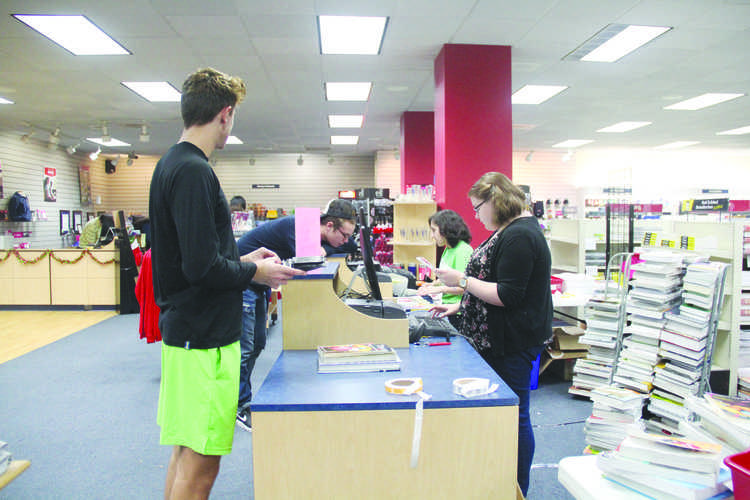Textbook prices continue to rise; Professors, bookstore try to make books more affordable
Photo by: Christina Xan
Students have the option to rent or buy textbooks from The Patriot Bookstore in the Smith University Center. The new price matching program introduced in November allows students to buy or rent textbooks from the bookstore at the same price of another retailer.
With textbook prices on the rise and students struggling to find the cheapest prices, FMU professors and the Patriot Bookstore are working to find the best way for students to afford their textbooks.
College Board recently estimated that textbooks for students across the nation will cost about $1,200 a year. There are two major factors driving up textbook prices.
One reason as to why textbooks are so expensive is the conglomeration of textbook publishers. There are three publishing companies that make up about 75 percent of textbook production. Those three companies are Pearson, McGraw-Hill and Cengage.
Conglomerates do not worry as much about competition, because they can equally inflate their prices. If the three companies produce books that are the same price, other companies will be less likely to have a presence in the market because those three cover a majority of the market.
Another reason why it is costly to buy from a bookstore is that they also markup the publisher’s price. According to the National Association of College Stores, in 2012 approximately 21.6 cents of each dollar of a textbook went to the bookstore, about one cent went to shipping and handling, and the other 77.4 cents to the publisher.
According to the U.S. Bureau of Labor Statistics Census Bureau, textbook prices have increased 812 percent since 1978. The Consumer Price Index has increased 250 percent since then as well, meaning that the increased prices of textbooks have tripled compared to the increased prices of other goods.
In 2013, the Student Public Interest Research Group (SPIRG) surveyed 2,039 students from more than 100 college campuses across the U.S.
One of the main conclusions drawn from the study was that, “65 percent of all respondents said that they had decided against buying a textbook because it was too expensive…94 percent of students who had foregone purchasing a textbook were concerned that doing so would hurt their grade in a course.”
The FMU campus also reflects these statistics.
“I haven’t bought my art book because of the expenses. I’m worried that it’ll affect my grade because we have readings, so I have to find other people so I can copy,” Alaina Barr, a freshman biology student, said.
Many students who have friends in the same academic departments also try to find other students who may have the textbooks.
One professor, Elizabeth Zahnd, is going out of her way to make sure that students can afford to have the textbooks that they need for class. One thing that she does is use the same textbook for French 101, 102 and 201. The textbook for French 202 she says costs around $30 used.
“I realize that many of our students are on financial aid and/or working outside jobs to pay for their education and every dollar counts,” Zahnd said. “I allow students to use older editions of the book as long as the core information is the same as in the updated edition, and I often put ancillary materials on reserve at the library or media center.”
Other professors are also working with their students to make books affordable. Some list suggested but not required textbooks on their syllabi, and others allow students to share textbooks as long as it does not impede their performance in class.
The Patriot Bookstore is also working on helping students afford textbooks by introducing price matching. The program began in November, and students can show price of a textbook from another company for the bookstore to match.
“We will be matching Amazon.com, Chegg.com, Rush.com,” Anna Kate Hutchinson, an FMU alumna and manager of the bookstore, said. “There are bunches of websites where students go and find cheaper books. That’s pulled a great deal of our business away, so we’re trying to bring the students back home and back to their on-campus book store.”
The textbooks must be matched new-for-new and used-for-used, meaning that if the bookstore only has the used textbook available, they will only match the used price from the other bookstore. Additionally, the website can’t be a third party, so the book has to be shipped from the warehouse of the website.
Hutchinson also said that the decreasing number of students buying from the bookstore is hurting the business. Because there is not a lot of income from textbook sales, other merchandise makes up a majority of sales.
“The bookstore doesn’t make a whole lot off of textbooks,” Hutchinson said. “Our profit actually comes from the general merchandise, trade, school supplies. Textbook prices are set by the vendors and set by our wholesale distributors. The margin on textbooks is very small. It’s only 10 to 12 percent. The prices that you’re seeing on the shelves are really the price of the vendor.”
Hutchinson is hoping that price matching will encourage FMU students to shop at the on-campus bookstore instead of looking for textbooks elsewhere. Students may find relief from high prices by asking their professors their textbook policies, such as if sharing is allowed or what could be an optional textbook, and by using the price matching program.
